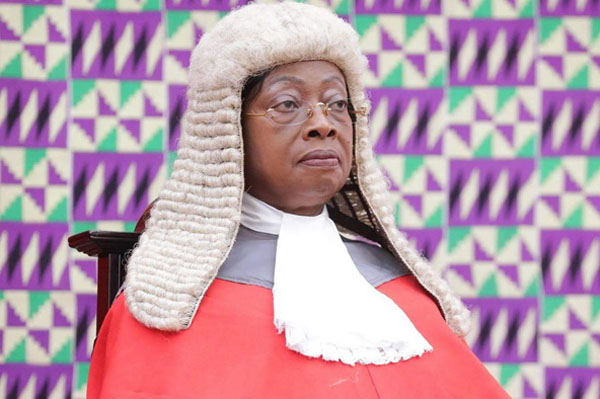The Chief Justice, Sophia Akuffo
The Chief Justice, Sophia Akuffo, has chastised some judges who have resorted to the writing of threatening and anonymous letters in newspapers to address emolument issues of magistrates and judges of the lower courts.
Justice Akuffo stated that it’s embarrassing to note that the judges have taken to the writing of serialized, threatening anonymous letters in newspapers rather than using the appropriate channels to address their concerns.
She disclosed that judges and magistrates must be mindful of the fact that the decision to embark on strike also has legal ramifications.
Magistrates and judges of the lower courts in the country have over the years threatened to embark on strike if government fails to review their salaries and pay their arrears.
According to the judges, the inability of successive governments to address their concerns over salary increment has become “frustrating, annoying and insulting.”
The judges feel they have no choice but to embark on strike if nothing is done to address their concerns.
Speaking at the 38th Annual General Meeting (AGM) of the Association of Magistrates and Judges Ghana in Accra, Justice Akuffo revealed that although the judges may have genuine concerns, the association is not a pressure group to use channels that are embarrassing to the Judiciary in the country.
“This association does not exist as a pressure group. It’s an interest group, and we share matters of common interest and at the same time bring their matters to the policy-makers. I just want to say that I am getting a little tired, I am not being personal, it’s becoming tiresome ‘we will strike, let us go on strike; when you strike it has certain legal ramifications.
“You are benchers, you are judicial officers, please take that into account. When things concerning the Judiciary end up in serialized, threatening, anonymous letters in newspapers, it’s a shame, it’s a shame on each and every one of us, and above of all it’s shame on the person or the group of people who write those things,” Justice Akuffo declared.
Fairness
The Chief Justice implored the magistrates and judges to continue to exhibit integrity, fairness and impartiality in the discharge of their duties.
She said the survival of the State depends on the confidence the people have in the institutions of state, particularly those that deal with the law.
“If citizens know that crime will be punished, they see no need to take the law into their own hands when a thief is caught, for instance. When they believe that disputes will be fairly heard and decided on its merits, we will see none of the unfortunate alternative measures that have been known to present themselves when people feel cheated and which are a blight and disgrace to the caliber of our services.”
Financial Independence
Justice Sophia Akuffo also bemoaned the absence of financial independence for the Judiciary in the country although the 1992 Constitution guarantees that.
She questioned the situation whereby the Judiciary is subjected to the same budgetary constraints as the Ministries, Departments and Agencies (MDAs).
“The Judiciary is given financial ceilings by the Ministry of Finance just like the MDAs whose financial independence is not guaranteed by the Constitution.”
She added that the Judiciary does not even receive all of its funds even after its budget had been approved.
“We receive on the average about 70 percent of the budget annually of which only 80 percent actually get to the Judiciary and their payments also delay unreasonably.
Attorney General
The Attorney-General, Gloria Afua Akuffo, commended the association for resolving to uphold freedom and justice in the country.
She urged the magistrates and judges to continue to dispense justice without fear or favour to uphold the independence of the Judiciary.
Ms Akuffo, however, bemoaned the lengthy trials which sometimes lead to disposing of cases despite the automation of the court systems.
By Gibril Abdul Razak


